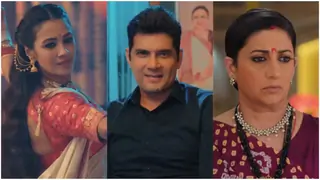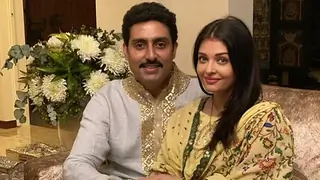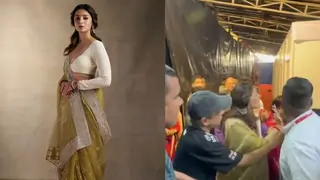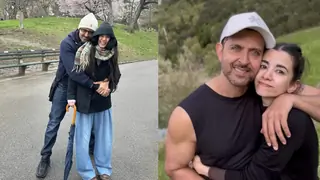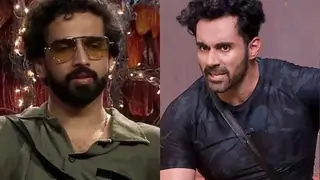They say that when you internalize a virtue then you begin to personify it. Therefore, the gentleness with which she carried the diya makes me say she hasn't got gentleness but rather she is gentleness. Only if the diya could speak to tell her not to distance me from yourself. The jewelry that adorned her spoke to her and said, "You've adorned us." The tears that filled her eyes pleaded Devdas not to come for a little longer as they yearned to stay in her eyes. The henna on her hands desired to be of such deep color that it never vanishes. The end of her sari that was dragged on the floor envied the half that draped her body, but knew that it is still superior to those that lie in her cupboard. The diya was caught in the dilemma of not wanting to hurt her delicate hands and to separate from her. Knowing that he was not as selfless as Devdas in loving Paro, he decided to remain in her hands. The pair of anklets that jingled as Paro walked could still hear the cries of its fellow anklets in the vendor's stall who said with envy, "What makes you worthy of those feet?" when Paro picked it out. But, the poor anklets dreaded the hour Paro takes them off, and thus it consoled its fellows with the words, "Be grateful for not being selected, for the torment of separation after meeting your beloved will be much greater than being neglected." The maids who walked with her wondered if they could receive some of her light. Even jealousy and envy could not cause them to curse her, for they feared if Paro died, who'd exemplify beauty? Or rather they were wholly spellbound by the personification of beauty before their eyes to utter any word.
But none of this was of any interest to Paro, for she only repeated the words she had been chanting for the past decades, " Kahan ho tum Devdas? Kabse meri aankhen tumhe dekhne kay liye taras rahi hai. Din beetay. Maheenay. Saal beetay par mujhe har waqt sirf tumhara khayal raha hai. Kaha ho tum Devdas?"
"Mera Deva Aayega" is the tune Paro danced to until she heard her maids, " Dekh Paro dekh tera Deva aaya."
The joy that filled her heart upon Devdas's arrival was evident in her subtle facial expression.
As Paro turned, the veil said to her, "I'm not capable of seeing you face to face, turn again before I burn." But how could she pay heed to the veil after seeing the purpose of her life standing before her eyes? And so the veil thinned away until Devdas could see his Paro as clearly as the full moon in the darkest night.
The candles were confused whether they were lighting up the stage or Paro was lighting them.
Paro's searching eyes as she said, "Tum ja rahe ho Dev mujhe istarah chod kar?" were hopeful of stopping Devdas from leaving, but this time Devdas had something different in mind.
The fear in Paro's eyes as she says, "Mere apno nay sab nay mujhe akela chod diya aur ab tum bhi? Kiou Dev?" is not that of being left alone. But, she dreads the day she'll have to spend without the hope of Devdas's return. She doesn't mind spending a lifetime in separation as long as the diya she holds is alight.
The amazed look she gave on hearing Dev's final word on separation is indicative of her awareness that her world has come to an end. She wondered what she could offer to destiny to save herself from this catastrophe.
Her eyes refused to weep as Paro wondered how she could be still alive after hearing her life telling her "You have no purpose to live." She couldn't decide if she's living these moments or experiencing death, how could you react to such an internal turmoil but express it through thunderstruck eyes?
One last attempt to escape death, and so she tells Devdas in a rebellious tone, "Tumhe apne aur sabke dard ki padi hai. Laikin merey dard, merey dukh ka kia Dev? jis kay saath maine tumhare intezaar mein apna saara jeevan guzaara hai' Aaj jab mein saari dunya ki laaj chohr kar tumhe apnaana chahti hoon, aise mod par tum'" But soon she gathers herself realizing she has to stop Dev from going.
On a physical level, she holds his hand, but we know that she's holding on her life not wanting to let it go. "Please don't go," she pleads in her heart.
Paro has learned that Devdas has become the soul of her life. Hence she tells him, "Tum mujhe aise chod nahi sakte Dev. Ab tum peechay nahi hat saktey. Mujhe apnaa lo Dev." It is either you embrace me or hand me over to death. I almost heard her saying, "Tum mujhe aise chod nahi sakte Zindagi." The desperation in Paro's eyes and expression could make the most lifeless object weep for her.
Par Dev nay chod diya, and she could see her life walking away. The drop of tears that sought refuge in her eyes and her changed expression overshadowed the lethal grief designed to destroy Paro.
In a self-reflective moment, Paro utters the following lines, "Main mohra nahi ban'na chahti. Mein to sirf itna jaanti hoon kay haalaat ne mujhe sirf dard diya hai aur in halaaton kay saharey main apna pyaar, apni zindagi nahi chod sakti. Aur tumhe'" She knew that she had enough of the world and its unending conditions. She didn't want to be treated like a chess piece. She knew that the entire world together can't bring her a speck of happiness once Devdas leaves her behind, for what happiness could you bring to a corpse who has lost the sentiment of joy?
Even her last words in the form of an admonition, "Shayad pehli baar, pehli baar main jaanti hoon kay main kya chahti hoon par tum nahi samjhoge. Aisa na ho kay jab tak tum samjho' buhut dair ho chukee ho" could not stop him.
And so he left. I wonder how could Devdas resist the Paro whose contrasting beauty caused the flame she held go pale?
Finally a word of appreciation for the actress who performed the beautiful character of Paro, and this appreciation is solely for Sanaya as Paro on stage. Referring back to the personification of virtue, I wouldn't say Sanaya has beauty but rather she is beauty. I wouldn't say she has grace but rather she is grace.
Criticism: The beginning of the play where Paro walks with candle was a disappointment. But later I learned Sanaya was expected to act confused and all. So this complaint is directed more to the creatives than the actress - that is one of my favorite scenes. Secondly, I expected them to show the play in one shot - the intermittent scene shifts to Mayank and Dia was pure disturbance.
Acknowledgements: Ishita, Anu & Aashi, thank you for helping me work out the images. And ofcourse Naveena, I've stolen the images from your quality video. Finally, Preeti, the moderator, thank you for reopening this thread.
Anyone with a critical mind is free to share his/her views.
[YOUTUBE]http://www.youtube.com/watch?v=-vNNBruJnO0[/YOUTUBE]
For Part 2, turn to page 15.





















